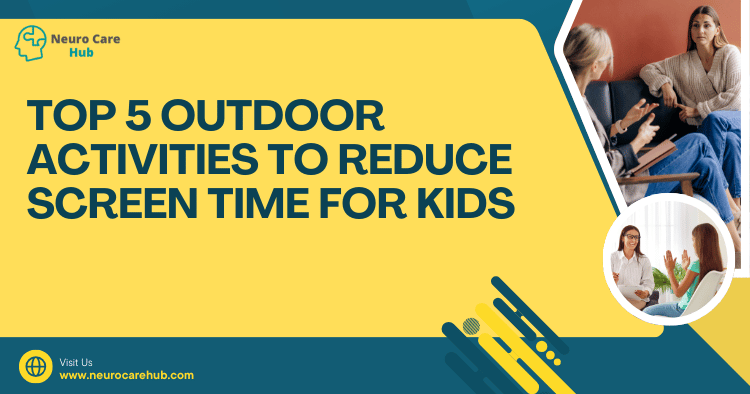Table of Contents
- Introduction
- 1. Nature Scavenger Hunts
- 2. Gardening Projects
- 3. Family Bike Rides
- 4. Outdoor Sports
- 5. Hiking Adventures
- FAQs
- Conclusion
Introduction
In our digital age, screen time has become an integral part of children’s daily lives. While technology offers incredible educational tools, it can also lead to sedentary behavior and a disconnect from nature. Encouraging outdoor activities is essential for promoting physical health, mental well-being, and social skills among kids. Below, we explore five engaging outdoor activities that can help replace screen time with enriching experiences.
1. Nature Scavenger Hunts
What Is a Nature Scavenger Hunt?
A nature scavenger hunt is an interactive game where children explore the outdoors to find specific items in nature, such as leaves, rocks, flowers, or insects. This activity can be easily customized to suit the local environment and the children’s age group.
Benefits
- Encourages Exploration: Kids learn to observe their environment closely, enhancing their curiosity.
- Promotes Learning: Children can learn about different species, ecosystems, and natural phenomena.
- Boosts Physical Activity: Running, walking, and climbing during the hunt helps kids stay active.
How to Organize
- Create a List: Make a list of items that are common in your area. Use images for younger kids.
- Set Boundaries: Define the area where the hunt will take place to keep children safe.
- Group Participation: Encourage teamwork by creating small groups. This promotes social interaction.
Resources
For more ideas on organizing scavenger hunts, check out National Geographic Kids.
“Exploration fosters creativity, and there’s no better place to ignite that spark than in nature.”
2. Gardening Projects
Why Gardening?
Gardening is a fantastic way for children to connect with nature and learn about plants, ecology, and responsibility. It offers a hands-on experience that can be both educational and therapeutic.
Benefits
- Develops Skills: Kids learn valuable skills such as planting, watering, and caring for plants.
- Promotes Patience and Responsibility: Watching a plant grow teaches children about patience and commitment.
- Encourages Healthy Eating: Growing their own fruits and vegetables can lead to healthier eating habits.
Steps to Start a Garden
- Choose a Suitable Location: Find a sunny spot in your yard or a community garden.
- Select Easy Plants: Start with easy-to-grow plants like tomatoes, beans, or sunflowers.
- Involve Kids in the Process: Let them help with everything from planting to harvesting.
Resources
For more gardening tips, visit the American Community Gardening Association.
“Gardening is a way of showing that you believe in tomorrow.”
3. Family Bike Rides
Why Bike Rides?
Cycling is a fun way for families to bond while staying active. Whether it’s a leisurely ride around the neighborhood or a more challenging trail, biking offers numerous benefits.
Benefits
- Enhances Cardiovascular Health: Regular cycling can improve heart health.
- Builds Leg Strength: It strengthens the leg muscles and improves overall endurance.
- Encourages Family Time: Bike rides can become a cherished family tradition.
How to Plan a Bike Ride
- Select a Safe Route: Choose bike paths or roads with minimal traffic.
- Check Equipment: Ensure bikes are in good condition and fit for each rider.
- Pack Essentials: Bring water, snacks, and safety gear like helmets.
Resources
For bike safety tips, check out NHTSA.
“Cycling is a journey; enjoy the ride as a family.”
4. Outdoor Sports
Why Outdoor Sports?
Engaging in sports not only fosters teamwork and cooperation but also helps kids develop physical skills and discipline. From soccer to basketball, the options are endless!
Benefits
- Promotes Teamwork: Kids learn to work together and develop social skills.
- Encourages Healthy Competition: Sports teach kids about winning and losing gracefully.
- Builds Confidence: Mastering a sport can enhance self-esteem.
Popular Outdoor Sports
| Sport | Age Group | Benefits |
|---|---|---|
| Soccer | 5+ | Improves coordination |
| Basketball | 7+ | Enhances agility and teamwork |
| Baseball | 6+ | Develops hand-eye coordination |
| Swimming | 5+ | Great for overall fitness |
Resources
For local sports leagues, visit Kids Sports Network.
“Sports are a great way to teach kids about life—and about themselves.”
5. Hiking Adventures
Why Hiking?
Hiking is a wonderful way to explore nature and appreciate the great outdoors. It allows families to discover new trails while promoting physical fitness.
Benefits
- Boosts Mental Well-Being: Being in nature has been shown to reduce stress and improve mood.
- Enhances Physical Fitness: Hiking is a full-body workout that improves cardiovascular health.
- Builds Family Bonds: It creates opportunities for conversation and shared experiences.
Tips for Hiking with Kids
- Choose Kid-Friendly Trails: Look for trails that are manageable for children.
- Pack Snacks and Water: Keep kids energized and hydrated during the hike.
- Incorporate Learning: Teach kids about the flora and fauna they encounter.
Resources
For hiking tips and trails, check out AllTrails.
“Hiking is not just a sport; it’s a way to connect with nature and each other.”
FAQs
Q: How much outdoor time should kids get?
A: The American Academy of Pediatrics recommends that kids spend at least 1 hour of physical activity per day, which can include outdoor play.
“Regular outdoor play is not just beneficial; it’s essential for a child’s overall development.”
Q: How can I encourage my child to enjoy outdoor activities?
A: Lead by example, make outdoor activities fun, and offer a variety of options to keep their interest alive.
Q: What if my child prefers screens over outdoor activities?
A: Gradually limit screen time and introduce engaging outdoor activities that align with their interests, like sports or nature exploration.
Conclusion
Encouraging outdoor activities is a vital step toward reducing screen time for kids. Whether through nature scavenger hunts, gardening, biking, sports, or hiking, the benefits of outdoor play are plentiful. Not only do these activities promote physical health, but they also foster creativity, social skills, and a lifelong appreciation for nature. So, grab your outdoor gear, and let the adventures begin! Your children—and their screens—will thank you for it.
“The best moments in life are often the simplest ones spent outdoors with loved ones.”
Also look for insights on how caregivers can enhance neuro care effectiveness, as creating a supportive environment for children can be crucial in encouraging healthy habits and activities. For more information on the importance of outdoor activities and their effects on brain health, visit Top 5 Ways Caregivers Enhance Neuro Care Effectiveness.






